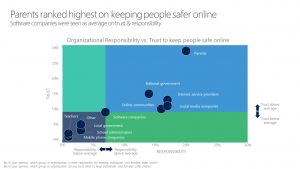Adults and teens around the world overwhelmingly view parents as the most trusted and most responsible group for keeping children and teens safe online, preliminary results of a new Microsoft study show.
Nearly one-third (29 percent) of respondents said parents are the most trusted, and one in five considered parents to be the most responsible for ensuring the safety of individuals and families online. Software companies scored 9 percent on trust and 7 percent on responsibility ahead of teachers (2 percent and 1 percent, respectively) and local government (3 percent on both categories), but lower than internet service providers, social media companies and national governments.
 Results are from the latest research associated with Microsoft’s work in digital civility — encouraging safer and healthier online interactions among all individuals and communities. The study, “Civility, Safety and Interaction Online — 2017,” polled teens ages 13-17 and adults ages 18-74 in 23 countries[1] about 20 online risks. The 2017 research builds on a similar study conducted in 2016 that polled the same age groups in 14 countries about 17 forms of online abuse. In 2017, there were 11,584 teens and adults polled in total.
Results are from the latest research associated with Microsoft’s work in digital civility — encouraging safer and healthier online interactions among all individuals and communities. The study, “Civility, Safety and Interaction Online — 2017,” polled teens ages 13-17 and adults ages 18-74 in 23 countries[1] about 20 online risks. The 2017 research builds on a similar study conducted in 2016 that polled the same age groups in 14 countries about 17 forms of online abuse. In 2017, there were 11,584 teens and adults polled in total.
Council for Digital Good shared its perspective on parents’ role in online safety
A straw poll among Microsoft’s teen Council for Digital Good during the Council summit last month echoed these results. Of the 15 council members, along with parents and chaperones, 23 voted parents to be the most responsible for young people’s online safety, while three cited teachers and three others pointed to technology companies generally.
“Parents who feel overwhelmed by the technology gulf between what they understand and what their kids have already mastered may be tempted to opt out of involvement in their kids’ digital lives,” said Sarah Siegand, mother of one of our Council for Digital Good members and co-founder of the online safety campaign Parents Who Fight. “Yet, the data shows that parents who simply engage in regular conversation with their kids about their online activity have a massive impact on their kids’ understanding of digital civility and responsibility.”
New countries, new data
The countries added to the 2017 Microsoft study are Argentina, Colombia, Hungary, Ireland, Italy, Japan, Malaysia, Peru and Vietnam. This year, respondents were also asked about additional risks, namely hoaxes, scams and fraud (as a single collective online risk), as well as micro-aggressions and misogyny. (Microaggressions are defined as casual insults made toward any marginalized group in society, such as religious or ethnic minorities, women, LGBT and people with disabilities.)
Final results will be made available on Safer Internet Day 2018, along with a year-over-year look at the Microsoft Digital Civility Index. The inaugural 14-country index, released on Safer Internet Day 2017, represents the lifetime exposure of respondents in each country to the 17 original online risks. We have again grouped the 20 risks into four categories:
- Reputational – “Doxing” and damage to personal or professional reputations
- Behavioral – Being treated meanly; experiencing trolling, online harassment or bullying; encountering hate speech and microaggressions
- Sexual – Sending or receiving unwanted sext messages and making sexual solicitations; being a victim of sextortion or non-consensual pornography (aka “revenge porn”), and
- Personal / Intrusive – Being the target of unwanted contact, experiencing discrimination, “swatting” (deceiving emergency services like police, fire or medical into sending an emergency response, typically to a person’s home, based on a false report of an ongoing critical incident or crime), misogyny, exposure to extremist content/recruiting, or falling victim to hoaxes, scams or fraud.
Back to school, back to online safety basics
We’re making this preliminary release in the back-to-school time frame to remind parents, educators and young people about the need for smart, safe and respectful online habits and practices at home, at school and on the go. For instance, in addition to strengthening your device’s defenses, keeping personal information private and safeguarding online reputations, consider re-committing to Microsoft’s Digital Civility Challenge by:
- Treating others as you would like to be treated, acting with empathy, compassion, and kindness in every interaction, and affording everyone respect and dignity.
- Respecting differences, honoring diverse perspectives and, when disagreements surface, engaging thoughtfully and avoiding name-calling and personal attacks.
- Pause before replying to contrary comments and refraining from posting or sending anything that could hurt someone, damage a reputation or threaten someone’s safety.
- Standing up for oneself and others by supporting those who are targets of online abuse or cruelty, reporting activity that threatens anyone’s safety and preserving evidence of inappropriate or unsafe behavior.
We will follow with another early look at some other key research findings in the weeks ahead. In the meantime, to learn more about online safety generally, visit our website and review our resources; “like” us on Facebook and follow us on Twitter.
[1] Countries surveyed: Argentina, Australia, Belgium, Brazil, Chile, China, Colombia, France, Germany, Hungary, India, Ireland, Italy, Japan, Malaysia, Mexico, Peru, Russia, South Africa, Turkey, the United Kingdom, the United States and Vietnam.
At the time of writing of this post, Jacqueline Beauchere’s title was Chief Online Safety Officer.
